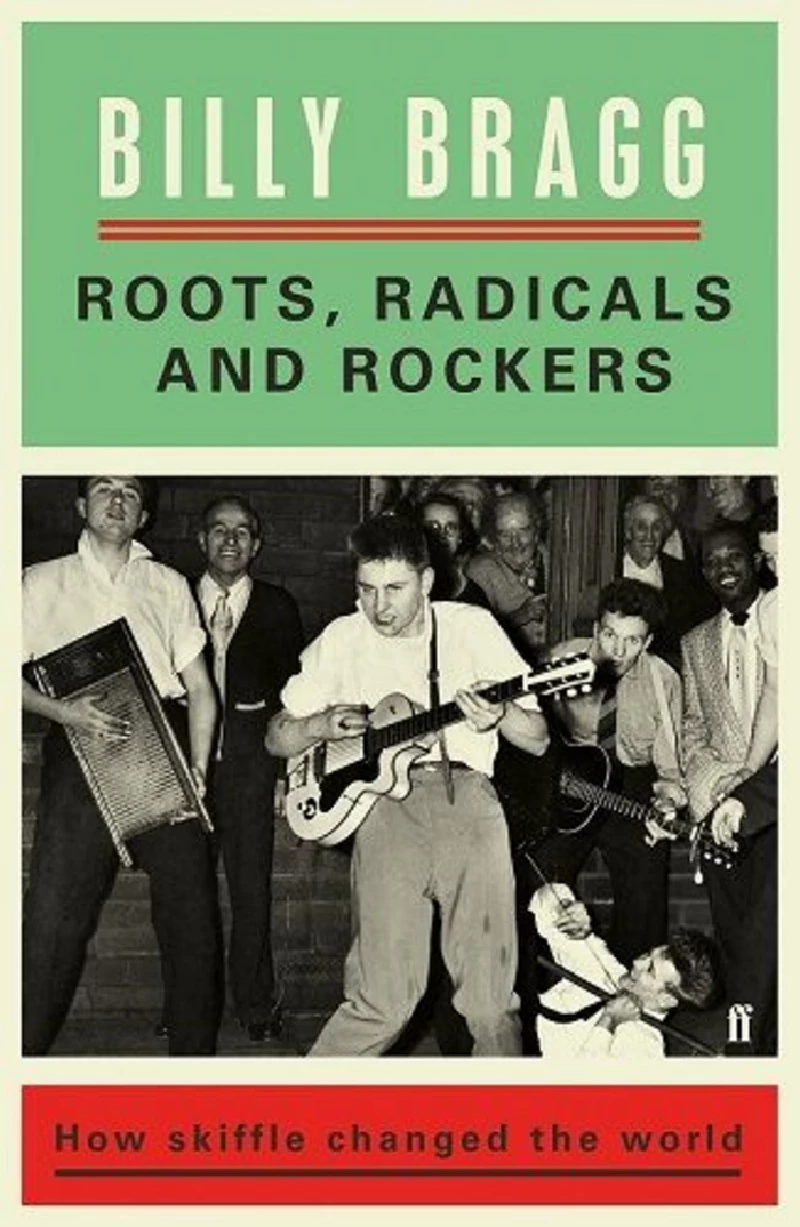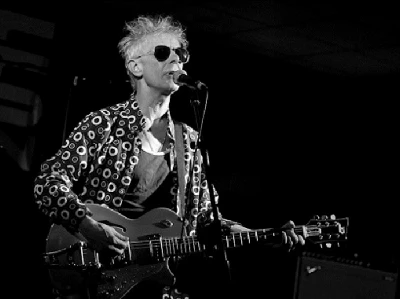Billy Bragg - Roots, Radicals And Rockers
by Lisa Torem
published: 16 / 9 / 2017

intro
In her 'Raging Pages'book review column Lisa Torem finds musician Billy Bragg's new book about the skiffle genre to be as educational as it is entertaining.
You can scratch your head and wonder why no insider (or even passionate outsider) had tackled writing about this essential pop genre in such depth until now, or you can simply allow guitar-slinging Billy Bragg to atone for those sins through the fascinating rock-lit journey entitled 'Roots, Radicals and Rockers: How Skiffle Changed the World'. Simply stated, it was this lo-fi genre, which never allowed electric instruments to see the light of day, and which any working class teen could emulate with a tea chest bass, broom stick and string, a washboard and sewing thimble, and the most rudimentary guitar or banjo, that paved the way for rock and roll. “Now something new sprang from the streets they walked, with an energy that threated to upset the drab conformity of post-war Britain,” Bragg surmises. He goes on to say that “Lonnie Donegan broke the fourth wall of Britain’s pop culture…” Obviously, Scottish entertainer Lonnie Donegan starred in this story because of his famed ‘Rock Island Line’ recording, but Bragg respectfully tells riveting backstories about the musicians with whom Donegan played years earlier in his storied career. Furthermore, Bragg dispels some common myths. No, it was not Lead Belly who wrote 'The Rock Island Line', although he did, indeed, promote the song with his booming voice and narrative ease. And the name of the genre, itself, was originally used in relation to rent parties, not even musical forms — similarly to the way American DJ Alan Freed rambled on air about rock and roll and made history, the “skiffle” name came about through a spontaneous interview response on BBC by musician Ken Colyer’s brother, Bill. This 400-page book includes many anecdotes and detailed stories of people that fell through the cracks. British Trumpeter Ken Colyer had set his sights high, but being a purist was determined to get to America to hear the roots music he grew up with and adored. As fate would have it, he acquired a job as cook on a ship, in the early 1950s and ended up in his dream town, New Orleans. He would have actually landed a job playing with his peers, except he crossed the cultural divide — American Immigration found out that he’d been fraternizing with black musicians and the next thing he knew he was deported. But all was not lost. He’d acquired the status of a high priestess. After all, he had heard the real thing and was now in a sought-after position by his British counterparts. Too bad, his irascible personality got in the way of his success at that point… Colyer and his brother, Bill, were ousted from the very band they had formed and went on to start a new band, which included trombonist Chris Barber and the aforementioned Donegan on banjo. It wouldn’t be long after that point that the band would record the groundbreaking hit that drastically changed pop music history. But before their big break, they withstood long hours gigging, and it was only due to their short sets of skiffle, that hung between the traditional jazz sets, that their catchy music drew a following. Bragg does a wonderful job describing Post War England and how its aftermath affected a generation of restless youth that craved a creative outlet. One sector of rebellious youth, which donned Edwardian clothing, were banned from clubs. These “teddy boys” would shake the establishment to its core, and, of course, heavily influence the Beatles, the Who and many more. Besides combing archives, Bragg conducted interviews with nearly thirty skiffle “veterans.” His extensive footnotes and bibliography cover a broad range of topics, ranging from sociological studies to scholarly works. This book is relatively short on photos and long on prose. If you’re looking for a breezy read, this might be more than you bargained for, unless you just want to cherry pick a few themes here or there, but if you do love skiffle and rock/jazz history you will thoroughly enjoy Billy Bragg’s newest baby. It’s written in a very reader-friendly style and addresses lots of burning questions with candour, humour and insight.
Also In Raging Pages
Alice Cooper (2015)
Beatles (2022)
Benjamin Orr (2018)
Bernard Purdie (2015)
Billy J. Kramer (2016)
Bob Boilen (2016)
Bob Dylan (2018)
Bob Marley (2019)
Brian Wilson (2017)
Byrds (2024)
Carl Ewens (2025)
Cher (2025)
Clive Davis (2015)
Common (2020)
Damned (2021)
Don Short (2020)
Donovan (2022)
Elliott Murphy (2019)
Elvis Costello (2015)
Felix Cavaliere (2022)
Flip Side (2025)
Frank Sinatra (2023)
Frank Zappa (2017)
Gary Wright (2014)
Gene Simmons (2015)
Geoff Emerick (2018)
George Harrison (2022)
George Martin (2019)
Green Day (2019)
Holger Czukay (2025)
Ian Mclagan (2016)
Iron Maiden (2014)
Jann Wenner (2019)
Jerry Lee Lewis (2015)
Jerry Nolan (2018)
Jim Summaria and Mark Plotnick (2019)
Jimmy Webb (2022)
Joe Perry (Aerosmith) (2014)
John Lennon (2017)
Kinks (2014)
Lani Hall Alpert (2019)
Laurence Juber (2014)
Liberty DeVitto (2021)
Lisa Robinson (2021)
Lita Ford (2021)
Little Anthony (2014)
Louise Harrison (2015)
Luke Haines (2024)
Manic Street Preachers (2017)
Mary Wilson (2021)
Michael Bloomfield (2020)
Michael Dorf (2019)
Miscellaneous (2014)
Ozzy Osbourne (2014)
Pamela Des Barres (2017)
Paul McCartney (2020)
Radiohead (2022)
Renee Rosen (2018)
Richard Balls (2018)
Rick Wakeman (2023)
Ringo Starr (2015)
Robby Krieger Band (2022)
Roger Daltrey (2020)
Rolling Stones (2016)
Ronnie Wood (2015)
Roy Bond (2023)
Sam Phillips (2018)
Sean Madigan Hoen (2014)
Silas House (2020)
Spencer Vignes (2017)
Spirit (2023)
Suzi Quatro (2023)
Sylvain Sylvain (2018)
Thin Lizzy (2016)
Tommy James (2021)
Tommy Mottola (2025)
Tori Amos (2020)
U2 (2021)
Who (2014)
Will Romano (2015)
Woody Woodmansey (2018)
Zz Top (2014)
live reviews |
|
229, London, 17/11/2011 |

|
| Dan Cressey finds that supergroup King Mob, which includes Glen Matlock and Chris Spedding in its line-up, are the most exciting new rock band of the year at their first gig at the 229 in London |
| Leadmill, Sheffield, 15/11/2011 |
| ICA, London, 17/9/2010 |
| Roundhouse, London, 4/3/2008 |
most viewed articles
current edition
Carl Ewens - David Bowie 1964 to 1982 On Track: Every Album, Every SongArmory Show - Interview with Richard Jobson
John McKay - Interview
Colin Blunstone - Thalia Hall, Chicago, 16/7/2025
Billie Eilish - O2 Arena, London, 10/7/2025
Bathers - Photoscapes 1
Visor Fest - Valencia, Spain, 26/9/2025...27/9/2025
Loft - Interview
Sir Tim Rice - Interview
Robert Forster - Interview
previous editions
Manic Street Preachers - (Gig of a Lifetime) Millennium Stadium, Cardiff, December 1999Heavenly - P.U.N.K. Girl EP
Beautiful South - Ten Songs That Made Me Love...
Peter Perrett - In Dreams Begin Responsibilities Interview Part One
Boomtown Rats - Ten Songs That Made Me Love....
Oasis - Oasis, Earl's Court, London, 1995
Coldplay - Wembley Arena. London, 16/8/2022
Trudie Myerscough-Harris - Interview
Prolapse - Interview
Pixies - Ten Songs That Made Me Love...
most viewed reviews
current edition
Davey Woodward - Mumbo in the JumboSick Man of Europe - The Sick Man of Europe
Lucy Spraggan - Other Sides of the Moon
Phew, Erika Kobayashi,, Dieter Moebius - Radium Girls
Suzanne Vega - Flying With Angels
Amy Macdonald - Is This What You've Been Waiting For?
Bush - I Beat Loneliness
Blueboy - 2
Alice Cooper - The Revenge of Alice Cooper
Cynthia Erivo - I Forgive You
Pennyblackmusic Regular Contributors
Adrian Janes
Amanda J. Window
Andrew Twambley
Anthony Dhanendran
Benjamin Howarth
Cila Warncke
Daniel Cressey
Darren Aston
Dastardly
Dave Goodwin
Denzil Watson
Dominic B. Simpson
Eoghan Lyng
Fiona Hutchings
Harry Sherriff
Helen Tipping
Jamie Rowland
John Clarkson
Julie Cruickshank
Kimberly Bright
Lisa Torem
Maarten Schiethart